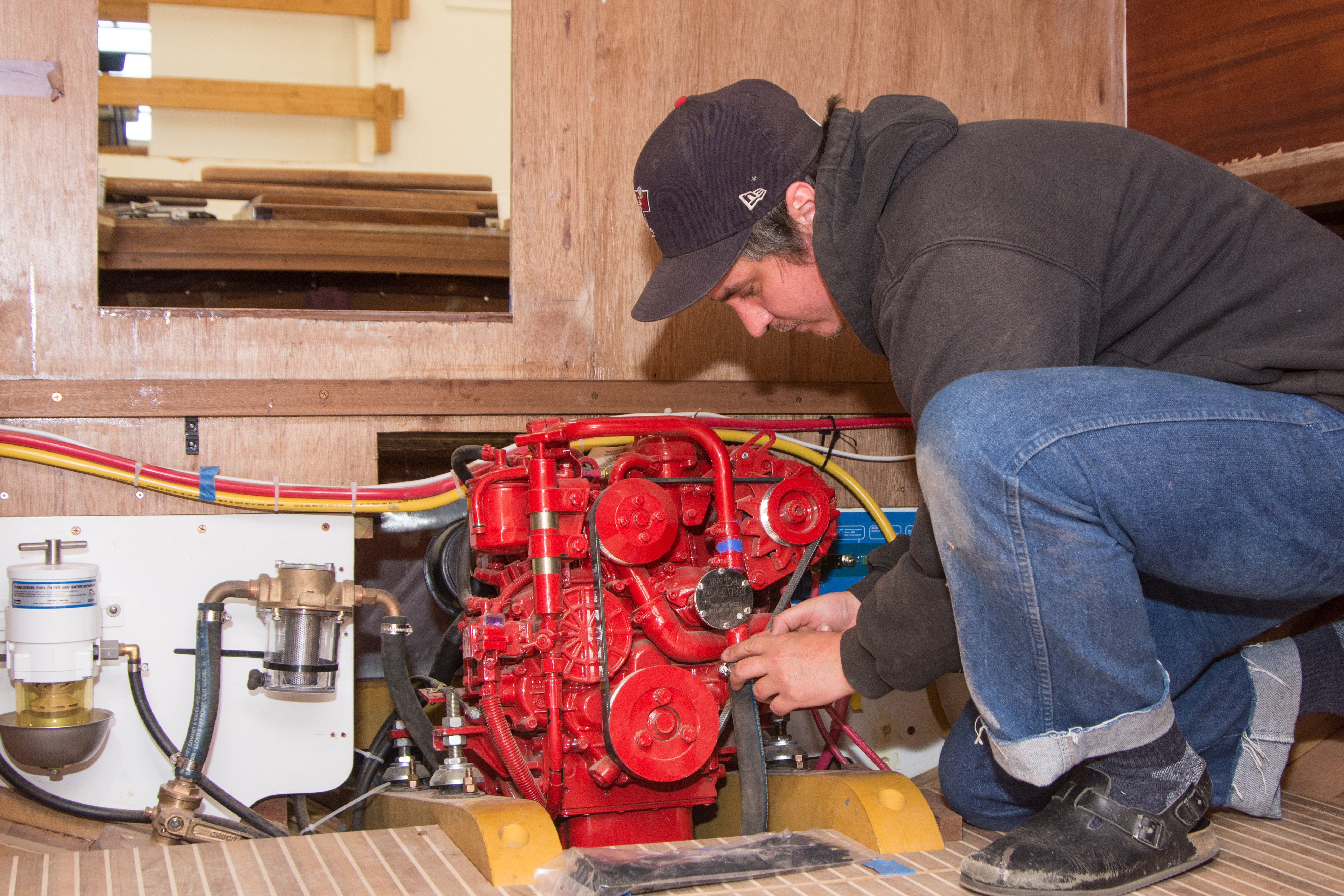Double the Learning, Double the Skill
Jeff Matthews combines boatbuilding and marine systems skills to take on bigger, more challenging projects as Prothero Intern.
The Prothero Internship, named for Boat School co-founder Bob Prothero, is a paid position that allows one or two Boat School graduates each year to spend additional time at the school, honing their skills in an environment that offers increasingly more challenging work, at a faster pace, and with more independence.
Jeff Matthews grew up in Olympia, Washington kayaking, hiking, and exploring the Puget Sound. His childhood interest in creating things—whether out of wood, paint, or food—led to work as a prep and line cook at a few restaurants before his mother suggested Boat School as a next step in his career path, something she’d always wanted to do. (Thanks, Mom!)
A Strong Start
As a boatbuilding student in the class of 2020, Jeff worked on Clean Bay, a zero-emissions pump-out boat that gave students experience with laminating, strip-planking, and cold-molded construction; vacuum infusion; foam core construction; working with CNC production; millwork; and joinery. Jeff built on this experience as a private contractor for Devlin Design and Boatbuilding for two and a half years.
As a student in the Marine Systems program, class of 2023, he worked on a zero-emissions pump-out module commissioned by the Port of Port Townsend that allows them to use an existing workboat as a black water pump-out boat. The autonomous unit includes a 250-gallon waste tank, high-capacity pump, hoses, batteries, and solar and AC charging equipment that can be put on the deck of any workboat. “I’m so proud of the impact these projects have had on the environment—not just locally but as prototypes for zero-emissions workboats and autonomous units that can be fitted onto existing boats to extend their utility.”
Responsibility, Lessons, and Challenges in New Boat Construction Projects
As Prothero Intern, Jeff’s first project was to work with marine systems instructors Kevin Ritz and Tyler Johnson to finish the wiring, tune the plumbing for the pump, install the solar panel, and test the pump. He was also responsible for planning and installing systems aboard Diana Lee, a 24’ custom troller constructed of a purpleheart backbone, oak frames, and red cedar planking that will remain local, just to the south of the school in Jeff’s home town of Olympia.
His work on the troller included alignment and installation of the engine and its propulsion (shaft, stuffing box, and propeller);  installation of the fuel tank and plumbing to the engine through the fuel filter; installation of the exhaust system; and thru-hulls for various systems, including raw water for the engine, bilge pump, and galley sink drain. He also worked on the layout of the electrical system and battery bank sizing to appropriately accommodate all the components going into the boat, finished the wiring, tuned and tested the plumbing for the pump, and installed the solar panel.
installation of the fuel tank and plumbing to the engine through the fuel filter; installation of the exhaust system; and thru-hulls for various systems, including raw water for the engine, bilge pump, and galley sink drain. He also worked on the layout of the electrical system and battery bank sizing to appropriately accommodate all the components going into the boat, finished the wiring, tuned and tested the plumbing for the pump, and installed the solar panel.
“On the troller project, I watched Jeff go from a student to a project leader—pulling a cohesive product together,” says Boatbuilding Instructor Leland Gibson. “Because he had gone through both the Boatbuilding and Marine Systems programs, he knows how to shape a backing block for a thru-hull and how to use the tools. We spoke the same language—boat vocabulary. The Prothero Internship was a continuation of his Boat School training—not just the mechanics, but sizing and the drive train—shaft, propeller, and double-checking the rudder. He also did all the ordering.”
His work on the Nordic folkboat included installing the bilge systems; all wiring and installation of the electrical system, including up the mast; and wiring and installation of the Torqueedo electric engine.
“Jeff’s work on the folkboat has been phenomenal,” says Boatbuilding Instructor Tucker Piontek. “He communicates really well. It’s been a total collaborative effort—discussions about finish, complexity, what the client would want. He presents options and we discuss them. He integrates his skills with wood work and systems with the bilge system he was installing exposed bare on the side of the teak/mahogany in the cockpit, he came up with a wood cabinet and built it.”
“My biggest learning experience as an intern,” says Jeff, “was the product management and the sourcing side of things as we planned and developed marine systems for the pump-out module and the troller—that and learning to trust my knowledge, developing the self confidence that comes with experience.
“I really look forward to getting back out there with a bigger bag of tools and the ability to solve even more of the fun problems you come across as a shipwright. This profession tests you daily, but it’s awesome to be able to work on boats for a living.

